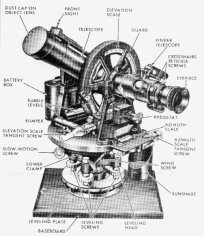Most of this post was assembled by three awesome students from last year. Thanks people!
Anybody else wonder what a theodolite is?
Here’s a definition. (Also, there’s an app for that.)
__________
Epic Poetry
Regarding the techniques used in an oral culture to remember information:
“Modern scholars recognize certain features common to oral poetry that often seem strange to readers. The key to all these so-called formulas is repetition, that indispensable prod to memory. In the Homeric epics, for example, long verse paragraphs recounting the details of sacrifice, the proffering of gifts, the naming of participants may be repeated almost word for word. Descriptive epithets repeatedly accompany characters’ names: “the swift-footed brilliant Akhilleus” or “Hektor, breaker of horses” or “the grey-eyed goddess Athena… these repetitions gave the bard a second to remember his place in the narrative… These oral formulaic devices, then, glued a massive narrative together, permitting feats of memory which readers in the computer age are more likely to associate with data banks than with poets.”
Read more about classical poetry here! It’s fun!
__________
Gutenberg
Turn the pages of a Gutenberg Bible.
An interactive map showing the spread of printing.
We’re all familiar with Project Gutenberg, but this automated bartending project by the same name is based on booze.
__________
Technological Determinism (aka the most terrifying thing ever)
A more recent expression of McLuhan’s view:
“While it depends on us, we are increasingly dependent on it. Like any child, it has its demands. So far, humanity as a whole is in denial that it even has a child.”
Not unlike the Cylons? Any Battlestar fans in the class?
Ever heard of the Technological Singularity?
__________
Lee de Forest has a website. Here, learn more about the audion.
__________
Braiiinss
More on London cabbies and their hippocampuses.
A summary of a study on illiterate ex-paramilitary forces comparing the brain structure of illiterate and literate adults and how it changes as they learn how to read.
Why not just study children learning to read? The article says it’s hard to distinguish the changes that come about from reading from the changes that occur due to normal development.
Does literacy steal brain power from other functions? According to this study, probably.
More info on magical mirror neurons and reading.
Are texting, emailing and other forms of purely verbal communication decreasing our ability to read non-verbal cues? This article says so.





If I marked based on my own TV preferences, you’d get extra credit for mentioning BSG.
Sadly, I don’t mark that way.
Maybe I should?
So say we all?
The Fleet thinks you should. So say we all.
We never got this offer!? What the frak!
HA! I give you extra credit, in absentia.
I accept!
I had to leave this somewhere. I watched this episode tonight and totes reminded me of 2001 a space odyssey.
http://en.m.wikipedia.org/wiki/Ghost_in_the_Machine_(The_X-Files)
SANDY! How’s tricks? Thanks for the link!